

China’s New Leadership_Chatham_2013. China at the Tipping Point. What will be the future of China’s authoritarian political system?
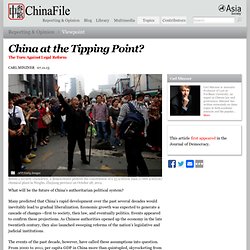
Many predicted that China’s rapid development over the past several decades would inevitably lead to gradual liberalization. Economic growth was expected to generate a cascade of changes—first to society, then law, and eventually politics. Events appeared to confirm these projections. As Chinese authorities opened up the economy in the late twentieth century, they also launched sweeping reforms of the nation’s legislative and judicial institutions. The events of the past decade, however, have called these assumptions into question.
These shifts have choked off institutions for venting dissatisfaction and redressing ills that are key to the CCP’s continued resilience as an authoritarian regime. China may indeed be at a tipping point. In the 1970s and 1980s, CCP authorities turned their backs on decades of political radicalism and socialist economic policies. Reforms continued throughout the 1990s. President Xi promises to shake off GDP obsession in promoting officials. BEIJING, June 29 (Xinhua) -- Chinese President Xi Jinping Saturday noted that China would never assess the performance of an official simply based on his record of boosting economy.
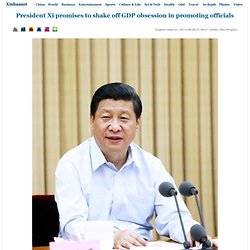
The Communist Party of China (CPC) should adopt more comprehensive criteria for assessing the performance of its officials, said Xi, also general secretary of the CPC Central Committee, at a meeting on the work of personnel resources on the eve of the 92nd founding anniversary of the Communist Party of China (CPC). It should consider a local official's work in various aspects including people's livelihood, the development of local society and the quality of environment. "We should never judge a cadre simply by the growth of gross domestic product (GDP)," he said. When promoting officials, the CPC organization departments should consider integrity as a priority and then capability, he said. They must serve the people heart and soul, exercise their power carefully and resist corruption, he said.
China deals with Bo Xilai case before leadership congress. Xi's War Drums - By John Garnaut. Every morning at 6 a.m., more than two dozen of the world’s leading submarine watchers, aviation experts, government specialists, imagery analysts, cryptanalysts, and linguists gather at the headquarters of the U.S.
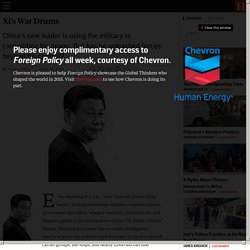
Pacific Fleet in Hawaii. Their job is to probe the overnight intelligence reports to guide the activities and strategies of the five aircraft carrier groups, 180 ships, and nearly 2,000 aircraft that constantly patrol the Pacific and Indian oceans. The morning meetings are convened by the fleet’s top intelligence officer, Capt. James Fanell, and cover activities emanating anywhere “from Hollywood to Bollywood,” as the head of U.S. Pacific Command, Adm. Fanell, in comments that went largely unnoticed outside the small circle of China military specialists, spelled out in rare detail the reasons the United States is shifting 60 percent of its naval assets — including its most advanced capabilities — to the Pacific. FOR XI, this is no idle question. It’s not just corruption. China's New Leadership - Hopes for Reform and Fear of Uncertainty - 02 - 2013.
LSE Asia Research Centre and LSE IDEAS panel discussion Date: Wednesday 13 February 2013 Time: 6.30-8pm Venue: TW1 G.01, Tower 1, LSE Speakers: Professor Athar Hussain, Dr Debin Ma, Professor Arne Westad Chair: Professor Stephan Feuchtwang (EVENT UPDATE: Change to venue.
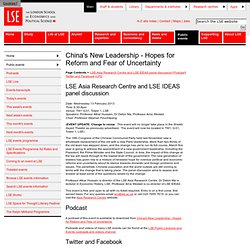
This event will no longer take place in the Sheikh Zayed Theatre as previously advertised. Heirs of Mao’s Comrades Rise as New Capitalist Nobility. Lying in a Beijing military hospital in 1990, General Wang Zhen told a visitor he felt betrayed.
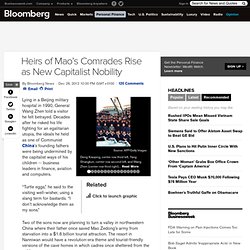
Decades after he risked his life fighting for an egalitarian utopia, the ideals he held as one of Communist China’s founding fathers were being undermined by the capitalist ways of his children -- business leaders in finance, aviation and computers. “Turtle eggs,” he said to the visiting well-wisher, using a slang term for bastards. “I don’t acknowledge them as my sons.” Two of the sons now are planning to turn a valley in northwestern China where their father once saved Mao Zedong’s army from starvation into a $1.6 billion tourist attraction.
Questions for China’s democracy opponents. This post, for example, made after Ma Ying-jeou’s victory Saturday by Hong Kong journalist Luqiu Luwei (闾丘露薇), was still being shared and discussed today: Just to give readers a sense of the microblog-based reach someone like Luqiu Luwei can have, she has a reported following on Sina Weibo of close to 1.3 million.
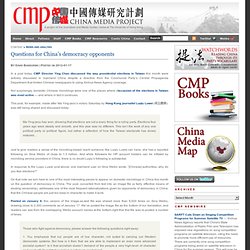
And while followers for VIP account holders can be inflated by microblog service providers in China, there is no doubt Luqiu’s following is substantial. In response to the Luqiu Luwei post above, one mainland user on Sina Weibo wrote: “[Chinese] authorities, why do you fear elections?” Meaghan Winter: Xiaolu Guo’s Modernity Enthusiasts. A fabulist film highlights the absurdity of breakneck-paced development, and its relevance inside and outside of China.
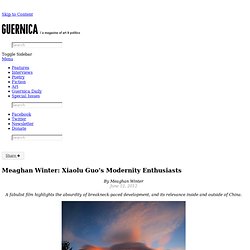
Image from Flickr via sandy.redding By Meaghan Winter On the outskirts of an isolated village in Southern China, surrounded by mountains, a woman meets a married schoolteacher for a tryst in a pasture, and during her dazed walk home finds a glowing stone. Is China Becoming a Mafia State? - John Garnaut. "The Myth of Chinese Meritocracy" by Minxin Pei. Exit from comment view mode.
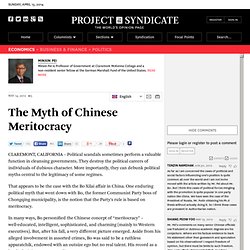
Click to hide this space CLAREMONT, CALIFORNIA – Political scandals sometimes perform a valuable function in cleansing governments. In thrall of the empire of the sons. Blood ties ...
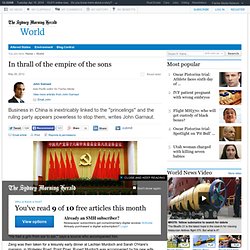
Some of China’s most respected public intellectuals are warning that Chinese society and the economy are being held hostage to the wealth-maximising requirements of the political elite. Photo: AP. China: Money, power and politics - Counting the Cost. We all know China has got money, but where does it come from?
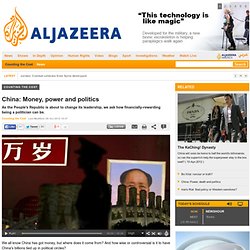
And how wise or controversial is it to have China's billions tied up in political circles? This week on Counting the Cost, we find out where China's riches and influence really come from - especially as there is about to be a leadership change there at next month's National People's Congress (NPC). China is increasingly a communist country in name only.